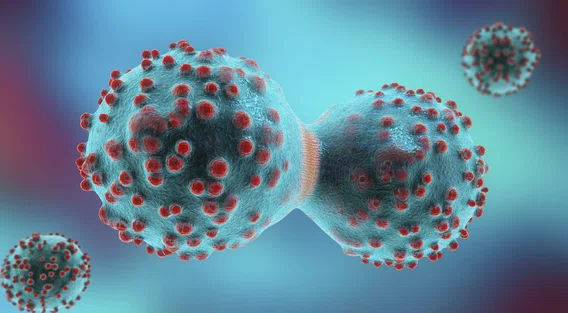


Precision medicine
Functional Genomics Screen Identifies a Key Determinant of Chemosensitivity
Functional Genomics Screen Identifies a Key Determinant of Chemosensitivity
A Genome-Wide CRISPR Library Screen Carried Out at Houston Methodist Identifies an Evolutionarily Conserved Signaling Network As A Key Determinant Of Chemosensitivity
A Genome-Wide CRISPR Library Screen Carried Out at Houston Methodist Identifies an Evolutionarily Conserved Signaling Network As A Key Determinant Of Chemosensitivity

Yulin Li, PhD
Cancer chemotherapy often induces significant tumor debulking, while sparing a small population of residual tumor cells, which can resurface as tumor recurrence months or years after patients are apparently cured of the primary tumors.
The mammalian or mechanistic target of rapamycin (mTOR) pathway has traditionally been an attractive cancer therapeutic target since mTOR dysfunction leads to tumorigenesis. The mTOR signaling network is evolutionarily conserved and regulates several basic biological and physiological processes including cell survival, growth, metabolism, aging, regeneration, protein synthesis, autophagy, inflammation and homeostasis. mTOR (a serine/threonine kinase) functions as a hub that integrates myriad intracellular and environmental signals.
Interestingly, out of five hundred clinical trials using mTOR inhibitors, few have demonstrated clinical benefit. Hence, the FDA has only approved a handful of mTOR inhibitors for the control of late-stage tumor expansion in specific cancers.
Yulin Li, PhD, assistant professor of Immunotherapy in Medicine at Houston Methodist demonstrated in a research study published in Nature Communications 2022 that mTOR inhibition promotes the development of a chemoresistant “persister” state, potentially contributing to tumor recurrence . The findings of Li are significant because they challenge the long-held paradigm that mTOR is an ideal therapeutic target and point towards novel therapeutic strategies to prevent tumor recurrence in cancer patients.
Li and his team at Houston Methodist performed a genome-wide CRISPR (Clustered Regularly Interspaced Short Palindromic Repeats) knock-out screen in a murine pancreatic cell line using gemcitabine and selinexor (two genotoxic chemotherapeutic agents). The screen identified the mTOR signaling pathway as a crucial determinant of chemosensitivity. Specifically, Li concluded that mTOR suppression in tumor cells leads to a drug-tolerant and chemoresistant persister population with a reversible phenotype. This is similar to the state of diapause induced by mTOR inhibition in which the development of mammalian embryos is paused due to unfavorable environmental conditions.

We observe that mTOR suppression promotes the induction of persisters in various cancer cells undergoing chemotherapy and dampens therapeutic efficacy. Similarly, others have shown that mTOR inhibition is chemoprotective in leukemia cells. Thus, the use of mTOR inhibitors can be counterproductive in the context of chemotherapy. This may explain the general lack of efficacy of mTOR inhibitors in cancer clinical trials and argues against their widespread use in combination with DNA damage-inducing agents. In this light, stimulation of mTOR signaling, but not its inhibition, may be the strategy of choice to reduce residual tumors and improve chemotherapeutic efficacy.

Yulin Li, PhD
Assistant Professor of Immunotherapy in Medicine at Houston Methodist

3d illustration of a cancer cell in the process of dividing. GETTY IMAGES.
The persister tumor population exhibits a senescence phenotype whose survival is dependent on autophagy and G2/M cell cycle arrest. The persister cells also showed multifaceted survival mechanisms based on a small molecule screen performed by Li. Interestingly, the mTOR inhibitor rapamycin has been demonstrated to prolong lifespan in various model organisms and mammals.
mTOR inhibition is not the best strategy for chemotherapy since it leads to tumor persisters that may lead to tumor recurrence. On the other hand, mTOR activation enhances chemosensitivity and improves survival in various human cancers. A growing body of research evidence supports this conclusion. For instance, germline and somatic mutations in cancer patients that lead to mTOR activation also cause heightened sensitivity to DNA damage-inducing cancer therapies.
According to Li, “We observe that mTOR suppression promotes the induction of persisters in various cancer cells undergoing chemotherapy and dampens therapeutic efficacy. Similarly, others have shown that mTOR inhibition is chemoprotective in leukemia cells. Thus, the use of mTOR inhibitors can be counterproductive in the context of chemotherapy. This may explain the general lack of efficacy of mTOR inhibitors in cancer clinical trials and argues against their widespread use in combination with DNA damage-inducing agents. In this light, stimulation of mTOR signaling, but not its inhibition, may be the strategy of choice to reduce residual tumors and improve chemotherapeutic efficacy.”
The findings of Li’s research emphasize that mTOR activation, rather than inhibition, should be the correct strategy to enhance chemotherapeutic efficacy and eradicate residual tumors for long-term survival of patients. Additional experiments that corroborate this hypothesis have the potential to enhance our understanding of this crucial signaling network and how it can be leveraged towards creating improved cancer therapies.
Yuanhui Liu, Nancy G Azizian, Delaney K Sullivan, Yulin Li. mTOR inhibition attenuates chemosensitivity through the induction of chemotherapy resistant persisters. Nat Commun. 2022 Nov 17;13(1):7047. doi: 10.1038/s41467-022-34890-6.
Abanti Chattopadhyay, PhD
August 2023
Related Articles








